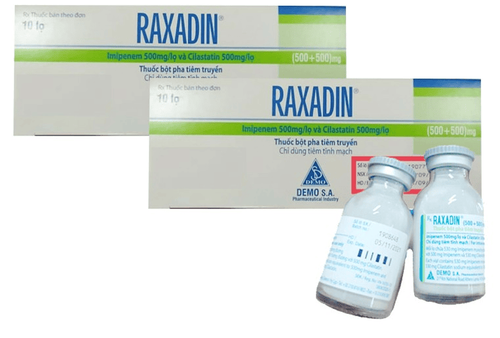This is an automatically translated article.
Children's cough for many days does not go away is a sign of many diseases, the most common of which is a respiratory infection. When a child has a cough that doesn't go away for a long time, in addition to careful monitoring and care, parents should also take the child to a doctor soon so that the child can be properly treated to avoid drug resistance or a worse illness.
1. What's the reason for a child's long-term cough that doesn't go away?
Children cough for many days can not go away from many different reasons such as living environment, children's resistance and improper care from parents.
Living in a polluted environment, especially air pollution, can have long-term effects on the respiratory system, causing children to cough forever. Children's resistance is weaker than others, which can be attributed to many causes, including lack of immunization against respiratory diseases such as Hib vaccine, Pneumococcal vaccine, and 6.1 vaccine.
In addition, a cough that does not go away for many days in children also comes from improper care of parents. Abstinence from eating too much during treatment, taking medicines that don't follow the schedule, taking medicines that don't last as long as prescribed by the doctor, can cause a child's cough to continue to persist.
Some medical conditions can also cause cough in children, if the disease is not treated, the cough symptoms can last for many days and do not go away. In which there are some typical diseases such as:
Upper respiratory tract infection: A common illness that causes a cough lasting more than 1 week with other symptoms such as fever, headache, fatigue, runny nose. . Asthma: Children under 3 years of age with bronchial asthma often have symptoms of a persistent cough, dry cough that appears in episodes, accompanied by chest tightness and wheezing after being exposed to allergens such as pollen, feathers. animals, smoke, emissions. Postnasal drip: Occurs when an excessive amount of mucus is produced after an allergy or viral infection. It usually causes a persistent cough, which is often worse at night. In addition to a persistent cough, some symptoms may appear, including itchy eyes, watery eyes, itchy neck, and sneezing. Gastroesophageal reflux disease: Chronic cough can occur in children with gastroesophageal reflux disease, the cough is often worse when the child sleeps at night. Reflux usually occurs during and after eating 30 - 60 minutes after eating or when changing positions. Whooping cough: After being infected for 5-10 days, children begin to show symptoms, typically a cough lasting 15-20 days, accompanied by fever, vomiting, cyanosis after the cough, heart rate slow. In infants, under 2 months of age, the disease is often aggravated because the child has not been vaccinated against the disease. Pneumonia: In addition to causing persistent coughs, pneumonia also causes other symptoms including fever, chills, shivering, and shortness of breath. Pneumonia can be caused by bacteria or viruses that cause illness, which is mainly transmitted in schools and play areas. Abuse of nasal decongestant sprays, causes congestion of the nasal mucosa, discharges from the back of the throat and causes a prolonged cough in children. In addition, weather factors such as dry, humid air can also cause a persistent dry cough.

Trẻ ho nhiều ngày không khỏi có thể do nhiều nguyên nhân khác nhau
2. What complications does a child's long-term cough cause?
Cough is a normal physiological response of the body to clear the airways, expel fluid, sputum, and foreign objects from the nose and throat. Based on the frequency of cough, the accompanying respiratory and systemic symptoms, determine whether the cause of the cough is physiological or pathological.Children who cough for many days can't go away can cause many complications affecting health, the most common of which are the following conditions:
Insomnia Fatigue Anorexia Weight loss, growth retardation Voice change Vomiting Vomiting Prolonged causes dehydration, electrolyte disturbances, body weakness Cough for many days that does not go away is one of the most common warning signs of respiratory diseases such as:
Pneumonia, nasopharyngitis, laryngitis, ear infection. Between Bronchitis For children with long-term cough that does not go away, parents need to closely monitor, do not arbitrarily buy antibiotics without a doctor's prescription. Using the wrong medicine can make your baby's health condition worse or resistant to the drug later in life. Children should only be given safe, over-the-counter pain relievers, such as cough syrups, expectorants, and fever-reducing medications.
During the care process, parents need to pay attention to monitor the child's temperature, nutrition and rest. The addition of adequate nutrients, giving the baby plenty of water, and eating lots of fruit can help support increased resistance. When there are other abnormal manifestations, you should take your child to the doctor to identify and treat the disease early.
3. How to take care of a child with a persistent cough?
A long-term cough that doesn't go away is a symptom of many diseases, so when a child's cough lasts for more than 1 week, parents should take the child to a doctor to find out the cause of the disease and completely treat the cough. During the treatment, it is necessary to absolutely follow the doctor's instructions and follow-up appointments, combined with providing adequate nutrients, regularly changing the menu to suit the baby's appetite, divided into several meals. eat small meals during the day, let children drink lots of water, drink more milk and fruit juices to supplement energy, vitamins and dilute phlegm; clean the nose and throat daily with physiological saline 2-3 times/day.
Cần đưa bé đi khám khi trẻ ho nhiều ngày không khỏi
4. How to prevent respiratory diseases for children?
In order to minimize the risk of respiratory diseases for children, parents need to pay attention to the following:
Comply with the vaccination schedule in the national immunization program to minimize the risk of infection. serious illness in children. Focus on changing the diet, promoting nutrition and resistance criteria, especially foods rich in vitamin C such as oranges, tangerines, grapefruit. Exercise regularly with children to exercise health Teach children to wash their hands properly and often Wear masks and glasses for children before going out on the street. Children cough for many days that does not go away is a sign of many diseases, the most common of which is a respiratory infection. Therefore, if the child's condition does not improve for a long time, the mother should soon take the child to the medical center for examination and treatment, to avoid dangerous complications that may occur.
With many years of experience in examining and treating diseases in children, now the Pediatrics Department at Vinmec International General Hospital has become one of the major health care centers, capable of examining , screening and treatment of many specialized diseases in children. Therefore, if the child shows signs of a long-term cough that does not go away or shows signs of respiratory infections, parents can take the child to Vinmec International General Hospital for examination and support. advice from doctors and health professionals.
Please dial HOTLINE for more information or register for an appointment HERE. Download MyVinmec app to make appointments faster and to manage your bookings easily.













